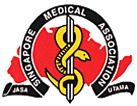
THESMANEWS
Present Issue
Past Issues
Journals
Present Issue
Past Issues
Letters to the Editor

![]()
This site is supported by Health ONE
Medical Students' Column - Letter from Oxford: Medical Interviews
Miss Michelle Teo is a fourth year medical student in Oxford University. She was involved in helping the SMA collate a community service directory.
The Oxford medical course is clearly delineated into a pre-clinical and a clinical phase. Entry into the pre-clinical course requires at least 1 interview through two interviews are the norm for foreign students. It is well known that there is a quota of 3 foreign medical students each year. Usually one Singapore applicant is accepted though there are some years no Singaporean is accepted.
Entry to study pre-clinical medicine here does not automatically secure a place in the John Radcliffe Hospital in Oxford for the clinical years. Instead other applicants for example with B.A. or B.Sc. degrees are also enticed to join the keen competition. However, all applicants have to pass the first part of the B. M. examination. This does not exclude non-pre-clinical students from studying Medicine. I know law graduates, who proceed to do pre-clinical medicine for 2 years and then join in the rush for clinical school places.
Presently, numerous applicants for the Clinical School are readying themselves for a panel interview with 6 doctors. Needless to say, they are all fairly anxious, realizing that success at the interview would enable them to train with some of the best doctors and surgeons in the world.
In my opinion, gaining entry to the clinical school is akin to a lottery. How does a 10-15 minute interview allow one to judge if you are a suitable candidate to become a doctor?
For major corporations, interviewing job candidates is an intense and rigorous experience, consisting of two interviews and an assessment center, with aptitude tests, personality inventories, report writing, practical tasks and exercises, group tasks, and giving presentations. By investing one to two days in this extremely thorough process, the companies attempt to ascertain your suitability for the job on offer. Then gain, they are not always correct.
I have previously experienced a mock, but intense, assessment center with Shell. We worked our way through real-life scenarios, and were given 40 minutes to prepare a 15-minute talk. The talk was assessed on a one-to-one basis with a senior member of the corporation. During that time, I am positive that they elicited more about my personality and cognitive skills compared to a medical interview.
What are medical schools looking for when they evaluate candidates ? According to Dr John Sear, head of the Oxford Clinical School, if one has consistently obtained distinctions preclinically, but has done nothing else but study, entry into the clinical school is not guaranteed. Most candidates are very similar when judged academically, therefore considerable emphasis is placed on the non-medical aspects of your life. I am fortuitous in that I can count myself among the few who were offered a place without an interview. Perhaps all that time spent on a basketball court and an athletics track accomplishes much more than just self-fulfillment.
The interview serves as a means by which your future clinical tutors assess whether they would like to work with you. You have to know more about yourself, than about various rare clinical syndromes.
They look for honesty and personality, not just candidates who are cardboard copies of an ideal prospect. One student was asked, "Which preclinical subject do you think will be most useful in your clinical years?". Instead o giving a textbook answer, he quipped: "I guess that I will find that out only when I begin clinical school." He is currently a successful Oxford student.
One of the factors which interviewees cannot overcome is the prejudice which the interviews may hold. The latter will always have conception of what a medical student should look like, and how a medical student should act. If one doesn't fit into this profile, hard luck.
Mistakes will always be made because the selection process is not 100% accurate. I have some very good medic friends whose company I enjoy, but I know that I will never approach them for a medical consult. For all I know, there are friends out there who will avoid me at all costs when I graduate.